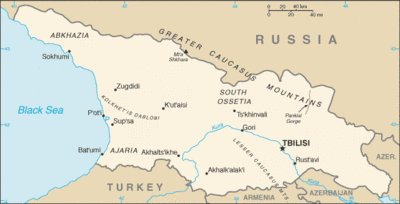Welcome to the Virtual Education Wiki ~ Open Education Wiki
Georgia
Partners situated in Georgia
None.
Georgia in a nutshell
(sourced mainly from http://en.wikipedia.org/wiki/Georgia_(country) )
Georgia (Georgian: საქართველო, sɑkʰɑrtʰvɛlɔ) is a country in the Caucasus region of Eurasia.
Situated at the juncture of Western Asia and Eastern Europe, it is bounded to the west by the Black Sea, to the north by Russia, to the south by Turkey and Armenia, and to the east by Azerbaijan.

Georgia has a population is 4.7 million, largely ethnic Georgians - thus similar in size to many smaller EU states. It covers a territory of 69,700 km²
Its capital is Tbilisi.
The history of Georgia can be traced back to the ancient kingdoms of Colchis and Iberia, and it was one of the first countries to adopt Christianity as an official religion, early in the 4th century. At the beginning of the 19th century Georgia became a part of the Russian Empire. After a brief period of independence following the Russian Revolution of 1917, Georgia was forcibly incorporated into the Soviet Union in 1922. Independence was restored in 1991.
Georgians call themselves Kartvelebi (ქართველები), their land Sakartvelo (საქართველო), and their language Kartuli (ქართული). Modern Georgian states have used differing names in different periods. The first modern Georgian state adopted the name Democratic Republic of Georgia. As part of the USSR the country was called the Georgian Soviet Socialist Republic. When Georgia broke from the USSR it adopted the name Republic of Georgia. Since it adopted its present constitution in 1995, the official name of the country is simply Georgia.
Like many post-communist countries Georgia suffered from the economic crisis and civil unrest during the 1990s. After the bloodless Rose Revolution, however, the new leadership has established efficient government institutions,[8] reformed the economy and guided the country through a period of the fastest economic growth in its history.
Georgia is a representative democracy, organized as a secular, unitary semi-presidential republic.
It is currently a member of the United Nations, the Council of Europe, the World Trade Organization, the Organization of the Black Sea Economic Cooperation (BSEC), and GUAM Organization for Democracy and Economic Development. The country seeks to join NATO and, in the longer term, accession to the European Union. However it does belong to certain organisations in Asia also.
In August 2008, Georgia engaged in an armed conflict with Russia and separatist groups from South Ossetia and Abkhazia. In the aftermath of the conflict Russia recognized the Georgian regions of South Ossetia and Abkhazia as independent states, but at present only a few countries (said to be Nicaragua, the Gaza Strip government in Palestine, and the de facto independent republic of Transnistria) have followed suit.
Georgia insists that Abkhazia and South Ossetia are "Russian-occupied territories" but part of Georgia. We reflect that view by categorising them as such but also giving them entries - brief ones only - as de facto autonomous states.
Regions and cities
Georgia is divided into nine regions and two autonomous republics. These in turn are subdivided into 69 districts.
The main cities of Georgia include:
- Tbilisi population 1,066,100 (metro area 1.27 million) - the capital
- Kutaisi - 186,000
- Batumi - 121,000
- Rustavi - 116,000
- Zugdidi - 75,000
All other cities are towns of less than 50,000.
The regions are:
- Abkhazia (autonomous republic - de facto independent)
- Adjara (autonomous republic, but overseen by Georgia)
- Guria
- Imereti
- Kakheti
- Kvemo Kartli
- Mtskheta-Mtianeti
- Racha-Lechkhumi and Kvemo Svaneti
- Samegrelo-Zemo Svaneti
- Samtskhe-Javakheti
- Shida Kartli
South Ossetia is not a rgion but an autonomous administrative district - de facto independent.
Georgia education policy
Georgia education system
Higher education
Universities in Georgia
The following is taken from http://en.wikipedia.org/wiki/List_of_universities_in_Georgia
State Universities
- Ilia Chavchavadze State University (Tbilisi) [1]
- Tbilisi Ivane Javakhishvili State University [2]
- Batumi Shota Rustaveli State University [3]
- Akaki Tsereteli State University (Kutaisi) [4]
- Telavi Iakob Gogebashvili State University [5]
- Georgian Technical University (Tbilisi) [6]
- Gori University [7]
- ISET - International School of Economics at TSU (Tbilisi) [8]
- Tbilisi State University of Economic Relations [9]
- Tbilisi State Medical University [10]
- Georgian State Agriculture University (Tbilisi) [11]
- Georgian State University of Subtropical Agriculture (Kutaisi) [12]
- Tbilisi Vano Sarajishvili State Conservatory [13]
- Tbilisi State Academy of Arts [14]
- Shota Rustaveli University of Theater and Cinema (Tbilisi) [15]
- Batumi State Maritime Academy [16]
Private Universities
- Free university of Tbilisi [17]
- The University of Georgia (Tbilisi) (Tbilisi) [18]
- David Aghmashenebeli University of Georgia (Tbilisi) [19]
- Grigol Robakidze University (Tbilisi) [20]
- International Black Sea University (Tbilisi) [21]
- Georgian American University (Tbilisi) [22]
- European School of Management - Tbilisi [23]
- Tbilisi Public University "Metekhi" [24]
- Tbilisi University [25]
- All-Georgian Society - Tbilisi David Aghmashenebeli University [26]
- Georgian Economy and Law Institute (Tbilisi) [27]
- Zugdidi Independent University [28]
- Kutaisi University of Law and Economics [29]
- Georgian National Institute "Rvali" (Rustavi) [30]
- Tbilisi Department of American University for Humanities [31]
- Sukhishvili University (Gori) [32]
- Georgian-Britain University of International Law and Management (Tbilisi) [33]
- Tbilisi Institute of Asia and Africa [34]
- Tbilisi Medical Institute "Hippocrates" [35]
- Tbilisi Petre Shotadze Medical Academy [36]
- Medical School "AIETI" (Tbilisi) [37]
- Kutaisi Institute of Medicine [38]
- Institute of Medicine Management and Stomatology (Tbilisi) [39]
- Georgian Aviation University (Tbilisi) [40]
Polytechnics in Georgia
Higher education reform
The Bologna Process
(very important for European countries)
Administration and finance
Quality assurance
Georgia's HEIs in the information society
Towards the information society
Information society strategy
Virtual Campuses in HE
Interesting Virtual Campus Initiatives
None are expected.
Interesting Programmes
There are possibly going to be some.
Re.ViCa Case-study
None.
Lessons learnt
None so far.